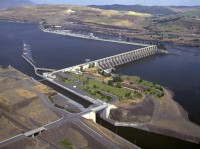“Oil pollution from dams must stop. Shockingly, the Army Corps faces no penalties for fouling our rivers with toxic oil pollution." -Lauren Goldberg, Staff Attorney, Columbia Riverkeeper
FOR IMMEDIATE RELEASE
Army Corps Reports Columbia River Dam May Have Spilled 474 Gallons of Oil

Oil spill the latest in a long line of spills from Army Corps dams
March 29, 2018 (The Dalles, OR)—The U.S. Army Corps of Engineers (Army Corps) reported The Dalles Dam may have spilled 474 gallons of oil into the Columbia River. According to the Army Corps, approximately 474 gallons of turbine oil was unaccounted for and presumed spilled into the Columbia during from February 7 to March 22, 2018. The Army Corps reported the spill to Columbia Riverkeeper, a non-profit organization, pursuant to a 2014 court settlement over uncontrolled oil spills from Columbia and Snake river dams.
“Oil pollution from dams must stop,” states Lauren Goldberg, Staff Attorney for Columbia Riverkeeper. “Shockingly, the Army Corps faces no penalties for fouling our rivers with toxic oil pollution,” states Goldberg. “People rely on clean water and healthy salmon runs. It’s past time for the U.S. Environmental Protection Agency and Governors Inslee and Brown to protect the public and Tribal nations’ rights to clean water in the Columbia Basin,” states Goldberg.
According to the Army Corps, the federal agency identified a problem while recording oil levels under its Oil Accountability Program. The Army Corps’ notice to Columbia Riverkeeper states that the powerhouse unit containing the presumed leaking turbine was shutdown and “[a] comprehensive inspection of the unit [Powerhouse Main Unit 5] will be conducted in early April when a turbine maintenance platform is available.”
In 2014, Columbia Riverkeeper settled a lawsuit against the Army Corps to stop oil pollution from eight dams on the Columbia and Snake rivers, including Bonneville, John Day, The Dalles, and McNary, Ice Harbor, Lower Monumental, Little Goose, and Lower Granite. The settlement required the Army Corps to apply for water pollution permits from the U.S. Environmental Protection Agency (EPA). The permits would require the Corps to monitor and reduce oil and other water pollution from the dams. To date, EPA has not taken action to reduce oil pollution and issue permits.
In the settlement, the Army Corps also agreed to study the use of non-toxic oils and implement an Oil Accountability Program to track oil spills. The Army Corps has not undertaken a significant shift to non-toxic oils at dams along the Columbia and Snake rivers and plans to issue a decision later this year.
“The Dalles Dam spill and many others demonstrate the Army Corps must switch to non-toxic oils,” states Goldberg.
Oil spills occur on a routine basis at Columbia and Snake river dams, including a series of oil spills at Lower Monumental Dam in 2017 that spilled over 1,600 gallons of oil into the Snake River. In 2012 the Army Corps reported discharging over 1,500 gallons of PCB-laden transformer oil at the Ice Harbor Dam on the Snake River. According to the EPA, PCBs cause cancer, as well as a variety of other adverse health effects on the immune system, reproductive system, nervous system, and endocrine system. The oil from the Ice Harbor spill contained PCBs at levels 14,000,000% greater than state and federal chronic water quality standards.
About Columbia Riverkeeper
Columbia Riverkeeper’s mission is to protect and restore the water quality of the Columbia River and all life connected to it, from the headwaters to the Pacific Ocean. Representing over 12,000 members and supporters, Columbia Riverkeeper works to restore a Columbia River where people can safely eat the fish they catch and where children can swim without fear of toxic exposure. Columbia Riverkeeper is a member of Waterkeeper Alliance, the world’s fastest-growing environmental movement, uniting more than 300 Waterkeeper organizations worldwide. For more information, go to columbiariverkeeper.org.
###


